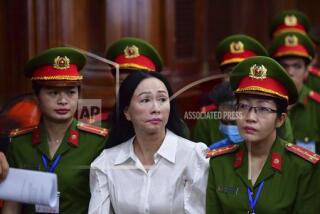B of A Wins License for Hanoi Unit : Banking: The San Francisco firm is first U.S. financial institution to get approval for an office in Vietnam.
- Share via
SAN FRANCISCO — Bank of America has become the first U.S. financial institution to win permission to open an office in Vietnam--18 years after the Communists drove American troops from Saigon.
At a news conference Thursday in Hanoi--a city once regularly targeted by U.S. warplanes--a B of A executive showed off the license awarded by the Vietnamese government and called it a breakthrough.
“As Vietnam begins opening to the international community, we feel it is important for the Bank of America to participate,” said Larry Greenberg, an executive vice president.
B of A’s new office in Hanoi, expected to open in a few weeks, will be run by Luu H. Le, 49, a native of Hanoi who has worked for 26 years for the bank, including in Saigon before the fall. Le now heads the bank’s Indochina representative office in Hong Kong, established last June.
Because of a long-running, U.S.-imposed trade embargo against Vietnam, the giant San Francisco-based bank will not be allowed to accept deposits or make loans, but its small office will be able to advise customers seeking to do business there. The license essentially allows B of A to begin the process of eventually doing business.
“Vietnam is eager to have foreign investment,” said Dick Holton, professor emeritus at UC Berkeley’s Haas School of Business. “It’s a promising place in many respects.”
In the Vietnamese enclave known as Little Saigon in Orange County, reactions to B of A’s plan were mixed.
“I don’t see any good from this,” said Duy Sinh Nguyen Duc Phuc Khoi, a leading opponent of U.S. business links with Vietnam. “This will help keep the Communists in power. The longer they are in power, the longer the 70 million people of Vietnam will suffer.”
However, D.L. Pham, a doctor and president of the Orange County Vietnamese Chamber of Commerce, said B of A’s move may encourage other companies to plan businesses in Vietnam.
B of A will join European and Asian banks making forays into Vietnam (population 72 million) to capitalize on what they see as a potentially booming market with an industrious, low-cost labor pool.
The bank was able to proceed with its plans, in the works for months, because of the departing Bush Administration’s decision in December to relax some restrictions on doing business in Vietnam. Since that breakthrough, B of A is the first major U.S. company to announce plans for an office.
Under the new rules, U.S. companies may set up offices in Vietnam and sign contracts with Vietnamese partners, but those deals cannot go into effect until the embargo is lifted. Some observers have speculated that President Clinton might end the sanctions within a few months, but that is far from certain.
Citicorp and Chase Manhattan are among other major U.S. banks interested in setting up shop in the formerly divided nation, and Delta, United and Northwest airlines have voiced interest in making their next stop Vietnam from other locations in Asia. The U.S. Treasury Department has said 24 companies have applications in the pipeline.
Among others said to be interested are Caterpillar, Hewlett-Packard, United Technologies, J. Walter Thompson, Bechtel, Boeing, Pepsico, Amoco, Chevron and Exxon.
Graham & James, a San Francisco-based law firm, has received a license to operate in Vietnam but has not yet put any of its own attorneys there. However, some of its affiliates operate in Hanoi.
Vietnam stands to benefit greatly from U.S. investment and trade.
The nation faces serious short-term problems, including rising unemployment exacerbated by the return of hundreds of thousands of guest workers from abroad, the repatriation of refugees and the return of troops from Cambodia. The nation has meager resources, low per-capita income and a woefully inadequate infrastructure.
“I think the potential is tremendous, but so are the obstacles,” said Virginia B. Foote, director of the U.S.-Vietnam Trade Council, a Washington-based group interested in promoting commerce with Vietnam.
Many U.S. companies have complained that the trade embargo has caused them to lose out on commercial prospects to rivals, notably from Taiwan, Hong Kong, France, Australia, Britain and Japan.
The United States banned economic links with the North Vietnam regime in 1964 under the Trading With the Enemy Act. Those sanctions were extended to the whole country when the South Vietnamese capital of Saigon, now known as Ho Chi Minh City, fell to the Communists in 1975.
With Japan’s reopening of broad economic ties with Vietnam in November, the United States was left the only nation maintaining an embargo against Vietnam. However, its influence has helped limit the flow of loans and other aid.
U.S. officials have said they will not lift the embargo until Vietnam makes a full accounting of U.S. service personnel still missing from the war.
If and when the trade ban is lifted, said spokesman Jim Mitchell, the bank would consider offering a range of products, such as short-term trade financing, foreign exchange and export credit.
The decision by B of A to set up a Hanoi office “is consistent with their emphasis (on offering) a full-service international network,” said John D. Leonard, a banking analyst with the Salomon Bros. investment firm in New York. “Very few others have that reach.”
*
Reuters and Times staff writers De Tran and Ted Johnson in Orange County contributed to this report.
More to Read
Inside the business of entertainment
The Wide Shot brings you news, analysis and insights on everything from streaming wars to production — and what it all means for the future.
You may occasionally receive promotional content from the Los Angeles Times.











